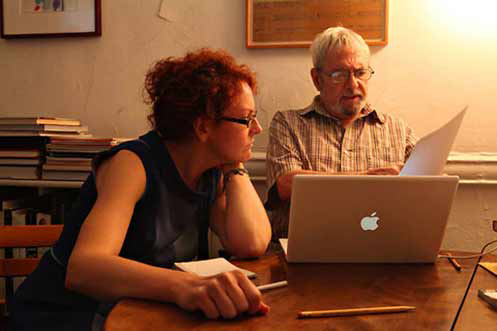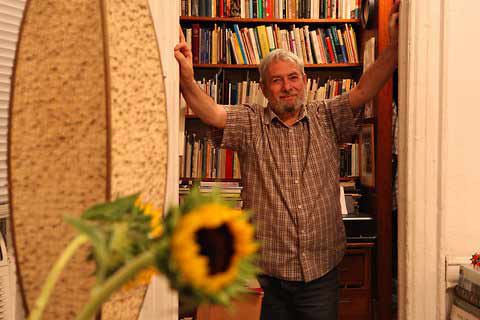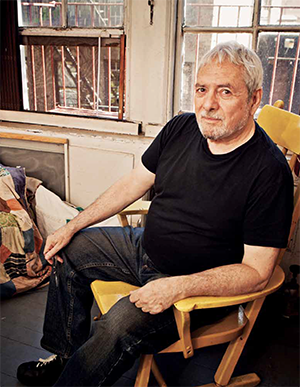Poets & Writers Magazine
Sept/Oct 2012
The Glass Filter
By Porter Fox
Photographs by Pieter M. Van Hattem
For over four decades poet Larry Fagin has delivered no-nonsense writing advice during private classes held in a setting that is decidedly unacademic: his own New York City apartment.
The New York Times
September 7, 2011

The poet Larry Fagin working with a student, Jennifer Kietzman, at his apartment in the East Village last month
The woman climbs the stairs in the shabby East Village tenement and enters while Larry Fagin is finishing a call with another poetry student.
“How’s Aiden? Is he old enough to go to college yet?” Mr. Fagin asks the man on the phone, making small talk. He motions for the woman to take a seat at the dining table, where her most recent poem is up on his computer screen. “O.K. Send money,” he barks and hangs up.
Mr. Fagin turns his attention to the woman, Jennifer Kietzman, 40, a due-diligence investigator from Borough Park, Brooklyn, with a full head of wild red curls. She leans over his shoulder as he dives into a wham-bam frenzy of changing word tenses, deleting entire lines and replacing words with synonyms.
He stops at the second line of her lengthy prose poem. “No, horrible. Bad poetry. That’s the worst line you’ve ever written.” He highlights the line and slams the delete key. “Goodbye!”
“I liked it,” Ms. Kietzman says in a shrinking voice and leans back in her chair. “Well, that’s O.K.,” she says. Mr. Fagin is not done. The stuff about Ms. Kietzman’s family, he says, “has got to stop. They’re cows. They’re furniture.” Highlight, slam delete key. “Goodbye!”
Four stories above East 12th Street, down the hall from Allen Ginsberg’s old apartment, one of the East Village’s last standing bohemians soldiers on.
Mr. Fagin, 74 years old, second-generation beat, New York School veteran, friend of Ted Berrigan, publisher of Ashbery, lives with his wife, Susan Noel, also a writer, in adjoining rent-controlled apartments in the building near Avenue A.
Although Mr. Fagin — a handsome, T-shirt-and-jeans kind of guy with a square build, tousled silver hair and a cheerful air of insubordination — now collects Social Security, his chief source of income for decades has been giving private creative-writing lessons and editing and producing small magazines and chapbooks from the work of students and friends.
He reports that despite former teaching gigs at the New School and St. Mark’s Church in-the-Bowery, neither he nor his wife have held anything resembling a straight job for any substantial period of time, though he has worked, he says, as a librarian, a reader to the blind and a “black marketer.”
“I try to be disaffiliated from bourgeois society,” Mr. Fagin said the other day, “like most good people. Because all we have are these very few, precious days.”
Mr. Fagin’s precious days typically begin with two hours of writing poetry, breakfast at the Neptune diner around the corner on First Avenue and a quick return to what he calls his “wonderland”: the two-bedroom walk-up (bathtub under the kitchen counter) lined with books, art, movies and music that he rented in 1968 for $58.50 a month with an old girlfriend.
He now pays about $150 a month for his warren in what he calls the “Chelsea Hotel of the East Village.” Ginsberg lived there for more than 20 years.
“Allen made the best chicken soup,” said Ms. Noel, a platinum blonde with black-rimmed cat-eye glasses, apple red lipstick and a strong residue of punk rock vitriol.
“He really energized the building,” Mr. Fagin said.
“Like a battery,” Ms. Noel added.
At any given time, Mr. Fagin has 20 to 30 students as diverse as a middle-aged real estate lawyer in Denver, a Bard undergraduate and a 75-year-old retiree in Florida. He charges $75 an hour, whether in person or on the phone, and has taught students as far away as China. Ms. Kietzman recently paid him $600 to produce 150 copies of a chapbook of her poetry and send them to his mailing list of writers and editors.
Mr. Fagin’s teaching approach focuses on paring poems down to their essence.
“Deep down I don’t care about the writer; I only care about what’s written,” he said. “Everyone is a terrible judge of their own abilities, and it takes someone else to say, ‘Hey this is great, or this is crap.’ And to say ultimately: ‘Hey you don’t matter. What you’re making, the object, is the only thing that matters. Your ego is just an impediment.’”
Much of Mr. Fagin’s own poetry can be brutally economical. His poem “The Skeleton” goes like this:
The skeleton has his own
bathing suit
He enjoys swimming and being
in the world
The xylophones are playing
peacefully
The skeleton is dancing
on the beach
We respect his frugality, neatness
patience, tact
He’s not just another
skinny person
Mr. Fagin seems to exert a magnetic pull on his students.
"If you have any inclination to get in touch with the arts, to express yourself creatively, and you live in this century, and in this city, and you’re struggling to make ends meet —and I fall into this category — you’ll be enamored by Larry,” said Kate Thompson, 30, a former market researcher from Clinton Hill, Brooklyn, who has studied prose fiction with Mr. Fagin for a year. “You walk into his apartment and it’s just filled with all this stuff you recognize and don’t fully know but you want to.”
In a classroom setting, Mr. Fagin has had mixed success. For about five years, until 2007, he was an adjunct at the New School, where he rubbed many people the wrong way, said one former student, Kathleen Kyllo.
“By the time the last class rolled around attendance was significantly lower,” she said in an e-mail. “Where students had once sat closer to him near the front of the room we were hanging back in a defensive mass.” She recalled an incident where Mr. Fagin announced to the class that her poetry was “too vaginal.”
Mr. Fagin acknowledged that he got “really mean” in the classroom. “You walk in and all these faces are staring at you and you want some reaction from them but they really have nothing to offer you. It’s like, come on you jack wagons!”
All in all, Mr. Fagin takes a blighted view of the current generation of aspiring artists, whom he likened to “pod people.”
“They are so inundated by information, they have no way to sort all this stuff out — it’s like being perpetually electrocuted but not realizing it,” he said.
Nor does he have much good to say about what has come of his once-beloved downtown art world, which, by his reckoning, ended in February 1975 at a dinner party around the corner hosted by Claes and Patty Oldenburg.
Mr. Fagin, who went with his friend the critic and poet Peter Schjeldahl, recalled his excitement that the artist Robert Smithson was to be in attendance. “But when we got there, all anyone talked about was real estate,” he said. “They’d all just bought lofts in what was later to be called SoHo. We left and I said to Peter, ‘Well, that’s the end of civilization.’”
Still, somehow, he perseveres to connect, especially with his students.
“To teach literature or history is in a way a losing battle because you cannot cross that crevasse,” he said. “They can’t get to you and you can’t get to them. You can just call to each other across the crevasse.”

